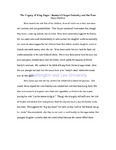The Legacy of King Sugar: Jamaica's Sugar Industry and the Poor

View/
Author
Rhinehart, Nancy
Subject
Washington and Lee University, Shepherd Poverty Program
Jamaica
Poverty
Imperialism
Sugar trade -- Economic aspects
Manley, Michael, 1924-1997
Land reform
Malnutrition
Immigrants
International business enterprises
Metadata
Show full item recordDescription
Capstone; [FULL-TEXT FREELY AVAILABLE ONLINE] Nancy Rhinehart is a member of the Class of 2003 of Washington and Lee University. The story of Jamaica entails a long complication of development that has resulted in the poverty that remains today. It echoes the history of much of the former New World. Since its takeover by the British from Spain in 1670, what was once an independent island inhabited by indigenous Arawak Indians has been maintained as the continual commodity exporter, most importantly of sugar, for foreign nations and multinational corporations. Thus their sugar industry persists centuries after its global domination and decades after its production peak, but not without deep physical and economic scars. The economic, and often political, situation of Jamaica is deeply intertwined with the history of the sugar industry to the point that many, if not most, of the causes cited for poverty in Jamaica today are a direct result of its dominance. As manifest in the case of the Jones', sugar remains a strong force on the lives of Jamaicans. Only through serious and certainly painful transition can Jamaica shed the scars of its past and move on into a more developed and less impoverished future. [From introductory section]